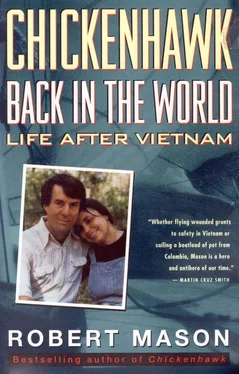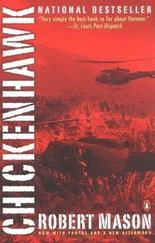Robert Mason - Chickenhawk - Back in the World - Life After Vietnam
Здесь есть возможность читать онлайн «Robert Mason - Chickenhawk - Back in the World - Life After Vietnam» весь текст электронной книги совершенно бесплатно (целиком полную версию без сокращений). В некоторых случаях можно слушать аудио, скачать через торрент в формате fb2 и присутствует краткое содержание. Год выпуска: 2013, Издательство: BookBaby, Жанр: Старинная литература, на английском языке. Описание произведения, (предисловие) а так же отзывы посетителей доступны на портале библиотеки ЛибКат.
- Название:Chickenhawk: Back in the World - Life After Vietnam
- Автор:
- Издательство:BookBaby
- Жанр:
- Год:2013
- ISBN:нет данных
- Рейтинг книги:3 / 5. Голосов: 1
-
Избранное:Добавить в избранное
- Отзывы:
-
Ваша оценка:
- 60
- 1
- 2
- 3
- 4
- 5
Chickenhawk: Back in the World - Life After Vietnam: краткое содержание, описание и аннотация
Предлагаем к чтению аннотацию, описание, краткое содержание или предисловие (зависит от того, что написал сам автор книги «Chickenhawk: Back in the World - Life After Vietnam»). Если вы не нашли необходимую информацию о книге — напишите в комментариях, мы постараемся отыскать её.
Chickenhawk: Back in the World - Life After Vietnam — читать онлайн бесплатно полную книгу (весь текст) целиком
Ниже представлен текст книги, разбитый по страницам. Система сохранения места последней прочитанной страницы, позволяет с удобством читать онлайн бесплатно книгу «Chickenhawk: Back in the World - Life After Vietnam», без необходимости каждый раз заново искать на чём Вы остановились. Поставьте закладку, и сможете в любой момент перейти на страницу, на которой закончили чтение.
Интервал:
Закладка:
“Sure,” John says. “You sit out there in California while the dingers are busting their nuts putting the fucking boat together. Comes on a truck. Comes in fucking pieces. Yacht-fucking-kit. What do you know about going to sea, Ray?”
Ray says something, but he speaks in a low voice. I met him when he arrived and he acknowledged me as one of the help. He was friendly, but distant. He was a businessman trying to get his ducks in a row. I sympathized.
“Yeah, you sailed. You sailed once,” John said. “Somebody else did the work, you were management, along for the ride.”
“Along for the ride?” Ray’s voice was angry.
“Okay. Okay. Sorry. I exaggerate sometimes—”
“Sometimes?”
Ray talked for a long time, and I drifted off. Did John know what he was doing? Or was Ray just being a nagging boss? I wished we could just get going.
Ray was gone the next morning. John told Bob and me that he had smoothed everything out. Ray was just an asshole worried about his money. “I told him he was going to make a fucking fortune and we were going to make it for him. Asshole.” We smiled. It’s great fun to hear the boss called names. Ray wasn’t the boss, but he was part of … management.
John took us to a nearby Big Boy restaurant for breakfast. While we ate, he told us we were almost ready. It had taken a month to get this far, but the time was near. I was happy to hear it and nervous as hell.
“We move the Namaste today,” John said.
“Move her? Why?” Ireland said.
“Guy at the marina knows what we’re up to.”
“He knows?” I said. “He said so?”
“Didn’t say it. I can tell. We move down the river. I figure we can finish up in two, three days.”
We sailed about twenty miles down the Saint Johns River to another marina. The Namaste sailed beautifully. I couldn’t get over how the light breezes could push this twelve-ton boat along at walking speed.
We got a slip at the marina. The autopilot, the vane gear, had just arrived from England. It’s called an Aries wind vane and John put me in charge of installing it. I had to drill oblique holes in the rounded stern and attach the mounting hardware. Took a day. When I’d finished, we had this weird-looking contraption hanging off the back of the boat. We christened it Rosalinda, in keeping with the Spanish theme that Ireland had established.
Rosalinda had a plywood vane, about the size of a blade on a ceiling fan, that reached above the deck about four feet. The vertical vane flopped around trying to keep aligned with the wind. When the vane twisted Rosalinda’s mechanism, it turned a long rudder that stuck in the water behind the stern. The wind vane’s rudder was attached to the tiller with ropes. The idea was that once a course was set, the wind vane would remain stable, pointing into the wind. If the Namaste changed course ever so slightly, the wind vane’s arm would twist and Rosalinda’s rudder would move and pull ropes that tugged the tiller and put her back on course. It was a clever rig.
That night we went to a movie, The Elephant Man , about a poor bastard who had a hideously deformed face and body. Afterward, everything disheveled, dirty, deformed, or smelly was preceded with the adjective elephant. A messy bunk was an elephant bunk; a tangled knot was an elephant knot; a stale beer was an elephant beer; and, of course, there was elephant underwear.
We drove to a shopping center in John’s elephant truck and raided a Publix. We were kids on a shopping spree. I think our high spirits resulted from the relief that something was finally happening. We used to do the same thing in Vietnam—get happy to be doing something, even if the something was going to get some of us killed. We ran up and down the aisles, each of us with two grocery carts, dumping in whole cases of food. We got canned meat, canned beans, canned vegetables. We got fifty pounds of rice. We got ten cases of beer. We got a case of Winstons. We got forty one-gallon plastic bottles of drinking water in case we ran out. We did all this yelling: “Hey, Juan. Needing theese corned beef?”
“Wanting; having,” John would yell.
“You like asparagus?”
“Wanting; having.”
People could not help noticing us. Probably they thought we were just crazy. It was fun buying all that stuff.
We took hours loading the boat. We packed the beer in the ice chest and buried it under four bags of ice. John said we’d re-ice it just before we left. This was a priority with John. He knew the ice would melt in a couple of days, but he was determined to have cold beer for as long as he could. Ireland and I seldom drank. We were smoking pot.
We pulled up the cushions on the starboard bunk to pack some of the canned food in the lockers there. John pulled out a padded rifle case and took the opportunity to show Ireland the gun he’d bought for the boat. He slid it out of the case—a Winchester .44 magnum lever-action rifle. “Nice,” Ireland said. “I guess.” Ireland wasn’t familiar with guns. He turned to me. “Nice, Bob?”
“Stop a charging rhino in its tracks,” I said.
Ireland shrugged, smiled. “Nice.”
John stashed the rifle under the other bunk and we stacked boxes of canned food in the locker space, converting the locker into an elephant locker. I noticed two cans of paint and a can of paint thinner and asked if we should throw them away—just take up room. John said we might need the paint in the Virgins.
We got to bed late.
We were ready.
John phoned the boss, but didn’t get a go-ahead. Something was fouled up with Ike, our Colombia connection. The next day, December first, the scam master still had us on hold, but John announced that we were leaving on the second anyway. “They’ll have it figured out by the time we get there.”
Patience and John’s wife, Alice, came to the marina in the morning. Patience brought my old flight bag, the same one I’d used in Vietnam. It was appropriate; I used to pack it when we stayed out in the boonies for a month at a time. She’d packed it with most of my clothes: four pairs of Levi’s, four sweatshirts, and one change of clean street clothes and loafers—for the drive back home. She showed me a packet of letters, each one dated; she said I should open them on those days. Patience likes to write. She’d also packed my Nikonos camera, a Vietnam talisman I was happy to have with me, my Texas Instruments programmable calculator I’d bought in New York when I was an executive, and my Swiss Army knife that Patience’s mother had given me. I had all my best and luckiest things to take with me.
We spent the day sailing the Namaste around the Saint Johns River. John showed off his sailing abilities by taking on challenges from other yachts and did really well considering the Namaste was such a tub. We practiced tacking, John yelling “Hard a lee!” when he was ready to make the turn, and got used to ducking the big main boom that swept across the cockpit when we came about. The jib had to be pulled over during the tack, but the staysail was self-tending, swinging across by itself when we came about. During this shakedown cruise, John showed us how his rigging worked. He’d run the halyards and down-hauls that controlled the sails, aft through guides on the deck, and into the cockpit, allowing us to control the sails and stay out of the weather. John used the same layout when he did his solo Atlantic crossings.
That afternoon we had a picnic on the boat back at the marina. I couldn’t taste the food. Patience was wide-eyed and distracted with nervousness, but she, too, had come to believe this trip was our only option.
Today was our seventeenth wedding anniversary. We went below and made love on the forward bunks—the only compartment with a door.
Читать дальшеИнтервал:
Закладка:
Похожие книги на «Chickenhawk: Back in the World - Life After Vietnam»
Представляем Вашему вниманию похожие книги на «Chickenhawk: Back in the World - Life After Vietnam» списком для выбора. Мы отобрали схожую по названию и смыслу литературу в надежде предоставить читателям больше вариантов отыскать новые, интересные, ещё непрочитанные произведения.
Обсуждение, отзывы о книге «Chickenhawk: Back in the World - Life After Vietnam» и просто собственные мнения читателей. Оставьте ваши комментарии, напишите, что Вы думаете о произведении, его смысле или главных героях. Укажите что конкретно понравилось, а что нет, и почему Вы так считаете.












